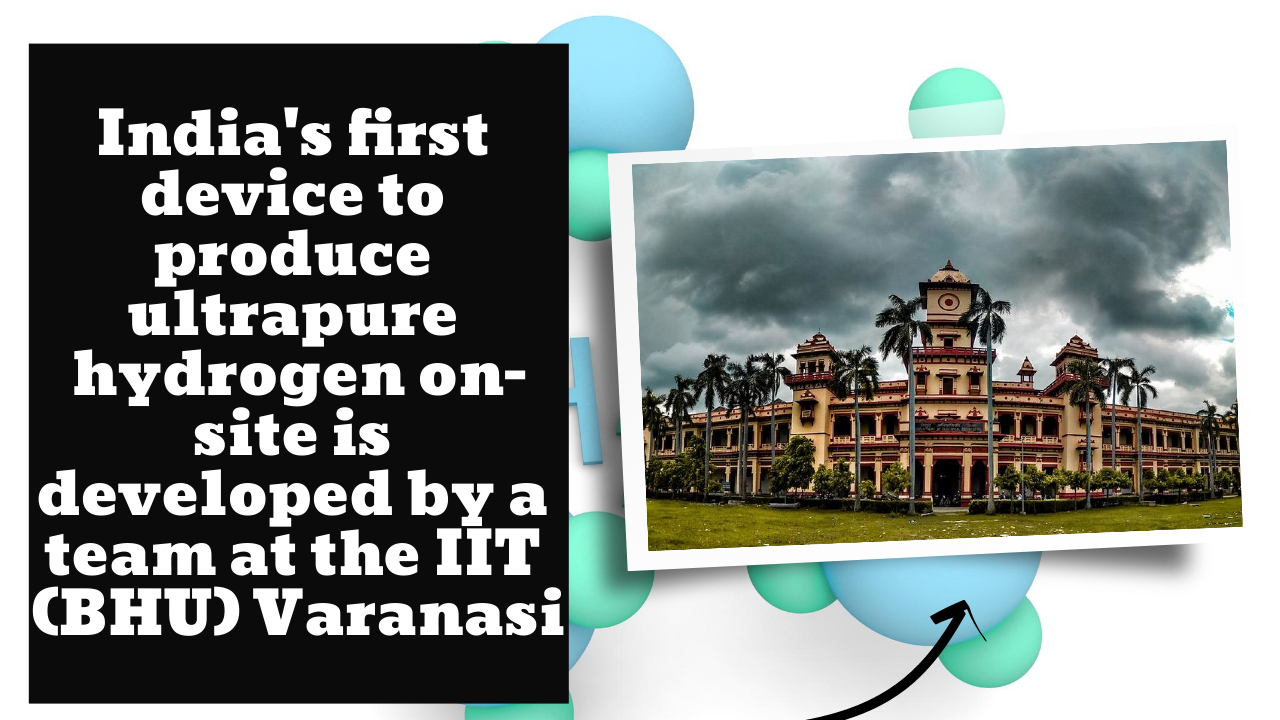First-of-its-kind hydrogen production system has been developed by Indian Institute of Technology (BHU) Varanasi’s scientists. With India’s goal to zero net emissions by 2070, this is a significant development in the United Nations Sustainable Development Goals. First of its type in India, the device produces Ultra-Pure Hydrogen. Mobile EV charging stations may be built utilizing this technology, and EVs can be charged without relying on the grid. GAIL (India) Ltd. is providing funding for the project.
Key Highlight:
- First-of-its-kind hydrogen production system has been developed by Indian Institute of Technology (BHU) Varanasi’s scientists.
- Mobile EV charging stations may be built utilizing this technology, and EVs can be charged without relying on the grid.
- The device, led by Rajesh Kumar Upadhyay, an associate professor in the Department of Chemical Engineering and Technology, is built entirely in India.
- A natural gas-powered device for on-site hydrogen generation will be tested soon, he said, adding that the testing will begin soon.
- The team is also working on a self-sustaining device that doesn’t need any external energy to function properly, he added.
Researchers at the Indian Institute of Technology (BHU) Varanasi in Varanasi, India, have built a first-of-its type on-site hydrogen production system in the country.. Since India has agreed to zero net emissions by 2070 at the COP 26 Climate Summit, this is a significant development in the United Nations Sustainable Development Goals.
The device, led by Rajesh Kumar Upadhyay, an associate professor in the Department of Chemical Engineering and Technology at the Indian Institute of Technology (BHU), is built entirely in India. The Ministry of Science and Technology’s Department of Science and Technology is funding the study.
Installing it at petrol pumps is a cinch. The gadget addresses a number of essential demands, including the generation of hydrogen for hydrogen vehicles, the ease of charging electric vehicles, and the provision of power to cell towers.
The tiny and ergonomically constructed equipment is geared toward sustainability and shows socioeconomic and environmental advantages. Ultra-pure hydrogen from methanol can be produced locally using membrane technology. In the fuel cell, it creates power by generating hydrogen from water (electricity). Additionally, the generated power can be used for EV charging, powering mobile towers, and generating hydrogen for hydrogen-based vehicles at gas stations.
At just 2 square meters in size, the gadget can be used in a wide range of applications. The methanol consumption for the creation of about 900 lit/hr of hydrogen is only 0.6 liters per hour.
The Indian government has recently announced the National Hydrogen Mission and the National Electric Mobility Mission Plan in attempt to minimize the country’s carbon impact and dependence on fossil fuels. In addition to charging electric vehicles with clean and green energy, hydrogen energy’s storage and delivery are two of the most pressing issues in this area. IIT (BHU) Varanasi experts recognized the problem and ramped up their assistance and efforts to find a solution using this technology.
As part of a recent demonstration, this device was integrated with a PEM fuel cell and generated 1kW of power. The team is also working on a self-sustaining device that doesn’t need any external energy to function properly.
Researchers led by Upadhyay remarked, “The indigenously constructed gadget is India’s first of its type producing Ultra-Pure Hydrogen. With this technology, a mobile charging station for electric vehicles can be developed, and the vehicles can be charged without relying on grid power. Powering the mobile towers, which now require 3-5 kilo-watts of power and are often powered by diesel generators, is also an option. Thus, this innovative technology will have a positive economic impact by reducing the infrastructure and power industry load. As part of this effort, we’re also considering replacing diesel generators and cutting fuel consumption dramatically,”
Upadhyay and his team are also developing a natural gas-powered version of this device. It will create hydrogen at a reduced cost and in a more compact form. As a result of the funding provided by GAIL (India) Ltd., A natural gas-powered device for on-site hydrogen generation will be tested soon, he said, adding that the testing will begin soon.
IIT (BHU) Varanasi director Pramod Kumar Jain remarked, “The prototype unit on membrane technology boosts Prime Minister’s ‘Make in India’ and ‘Self-reliant India’ efforts. India’s transportation and electricity demands may be fueled by hydrogen as a result of the new device’s ability to transform the country’s energy landscape. For researchers, but also for the general public, this technology has the potential to be game-changing. The Institute is working on all areas of hydrogen energy and is eager to develop a center of excellence in the Institute to accommodate the production and usage of hydrogen energy for relevant applications, notably in the transport and mobility sector.”





[…] IIT (BHU) scientists have developed a first-of-its-kind system in India for… […]